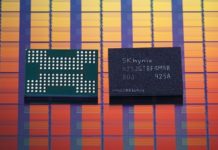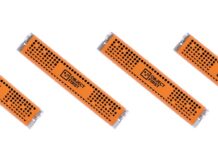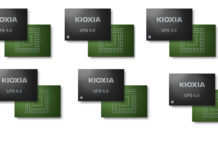Aerospike released v7.0 of its real-time, multi-model database with a new unified storage format and other in-memory database enhancements. The unified storage format provides the flexibility to choose the right storage engine for different kinds of workloads, even within the same cluster. Developers no longer need to understand the intricacies of in-memory, hybrid-memory, and all-flash storage models, it claims. The vendor said in-memory deployments gain fast restarts for enterprise-grade resiliency and compression that shrinks the memory footprint of real-time applications.
…
Grafana Labs has acquired Asserts.ai, whose technology will help Grafana Cloud users better understand their observability data and find issues more quickly, from the infrastructure to the application layer. Asserts.ai provides out-of-the-box insights into relationships over time among various system components, enabling users to better understand and navigate their applications and infrastructure. Asserts.ai serves as a contextual layer for Prometheus metrics and provides an opinionated set of alerts and dashboards so that users can more efficiently perform root cause analysis and resolve issues more quickly. Asserts in Grafana Cloud will be demoed during the keynote at ObservabilityCON 2023, and available in private preview soon.
…
GPU-powered RAID card provider Graid has a strategic partnership with ThinkParQ and its BeeGFS parallel file system. The union aims to address the increasing demands in High-Performance Computing (HPC), Artificial Intelligence (AI) and Deep Learning, Media and Entertainment, Life Sciences, and Oil and Gas industries. Graid president and CEO Leander Yu said: “By joining forces with ThinkParQ, we aim to redefine the benchmarks in high-performance computing, AI, and diverse industries reliant on data-intensive operations. The collaboration between SupremeRAID and BeeGFS creates an unparalleled synergy that not only enhances performance but also ensures comprehensive data protection, scalability, and flexibility.”
…
Graid has a strong focus on competing with software RAID supplier Xinnor (see here) and tells us Xinnor’s benchmark test notes say: “Applying the following kernel parameters will lead to a security risk. While they improve performance, they also reduce system security. Please use these parameters at your own responsibility.” Also: “It’s important to note that disabling or modifying these security mitigations can potentially expose your system to security vulnerabilities. These parameters are typically used for debugging or performance testing purposes and are not recommended for regular usage, especially in production environments.” Graid is saying that the performance numbers that you might get from Xinnor benchmarks are totally done for show and could never be achieved in a production environment. “No IT manager anywhere would compromise security for performance.”
…
HPE has a partnership with StorMagic and now includes StorMagic’s SvSAN as a new way to store backup data using HPE GreenLake for Backup and Recovery and HPE StoreOnce. HPE GreenLake for Backup and Recovery is a one-stop solution as HPE creates and maintains the backup environment as a service. HPE StoreOnce is a purpose-built, high-performance backup appliance designed to store copies of backup data in deduplicated form, allowing customers to reduce backup footprints by as much as 95 percent. StorMagic SvSAN is a simple, flexible, reliable HCI software solution that transforms any two x86 servers into a highly available shared storage cluster.
…
We wondered if HYCU, which is building SaaS app connectors, was thinking about developing a copilot like Cohesity, Commvault, Druva, and Rubrik. A source familiar with HYCU told us: “You can imagine that once you start to deliver all these new integrations that you’ll need a way to have customers understand the particular language of each SaaS application and/or what you are protecting and making available to recover. And you can imagine if you were to do this as more than just a simplistic Q&A tool, but to be meaningful to the customer so they have a deep understanding of the solutions they have available for items like, what would be the best place to keep this data, what ways can we be more efficient, etc. that makes for a powerful AI-based solution. For now, it’s safe to say it’s with early customers now and should officially come in calendar Q1 next year.”
…
iXsystems announced GA of its new performance flagship series of storage appliances, the TrueNAS Enterprise F-Series, along with the latest release of TrueNAS SCALE (23.10) software. These all-NVMe models were designed for maximum performance, reliability, and density to serve the most demanding workloads, while offering significant reductions in power, space, and TCO. With 30 TB NVMe drives, a single 2U system supports 720 TB of highly available storage.

The F-Series features:
- Two models to choose from: F100 with 30 GBps bandwidth per node and F60 with 20GBps bandwidth per node
- NVMe-powered storage for low latency and bandwidths greater than 20 GBps
- The F-Series easily scales from a few terabytes to 720 TB in only 2U, meeting a wide range of user requirements. Both scale-up and scale-out technologies can be used to increase capacity
- Dual-controller architecture provides continuous accessibility, preventing data downtime
- Vast connectivity options to maximize interoperability
…
France-based Kalray announced its NG-Box, a disaggregated NVMe storage array based on Dell PowerEdge servers combined with Kalray DPU-based storage acceleration cards. NG-Box is designed for unstructured data workloads to offer reliable, fast, automated, and scalable on-premises Tier 0 storage for data-intensive workflows which are increasingly AI-focused. The NG-Box delivers over 80 GBps per server. Industry tests such as IO Zone and FIO show doubled performance compared to non-DPU accelerated versions of the server and reduced transaction latency. NG-Box is part of the Kalray NGenea data management platform which also includes NG-Stor and NG-Hub. It’s showcasing the NG-Box at SC23.
…
XConn Technologies, an HPC interconnect supplier, announced a strategic partnership with composable systems supplier Liqid to deliver composable memory based on the Compute Express Link (CXL) 2.0 protocol. Enabling the orchestration of disaggregated devices connected via CXL fabric, Liqid Matrix software now supports the XConn Apollo switch, a hybrid CXL 2.0 and PCIe Gen 5 interconnect system. On a single 256-lane SoC, the XConn switch offers the industry’s lowest port-to-port latency and lowest power consumption per port in a single chip at a low TCO. Liqid Matrix composes CXL memory device endpoints to CXL connected hosts, disaggregating the memory from the host server CPU complex and connecting via CXL to a server where DRAM memory is accessed directly for applications and workloads to use with exponential efficiency. The XConn/Liqid demonstration will be featured during SC23, November 12-17, in Denver in both XConn’s booth #1301 and Liqid’s booth #1219.
…
MSP backup service supplier N-Able announced Q3 calendar 2023 revenues of $107.6 million, up 15 percent year-over-year, with a profit of $6 million. Subscription revenue amounted to $105.2 million, up 15.3 percent. On September 30, 2023, total cash and cash equivalents were $127.4 million and total debt, net of debt issuance costs, was $335.5 million. The Q4 outlook is for revenues of in the range of $106.5 to $107.0 million, representing approximately 11 to 12 percent year-over-year growth.
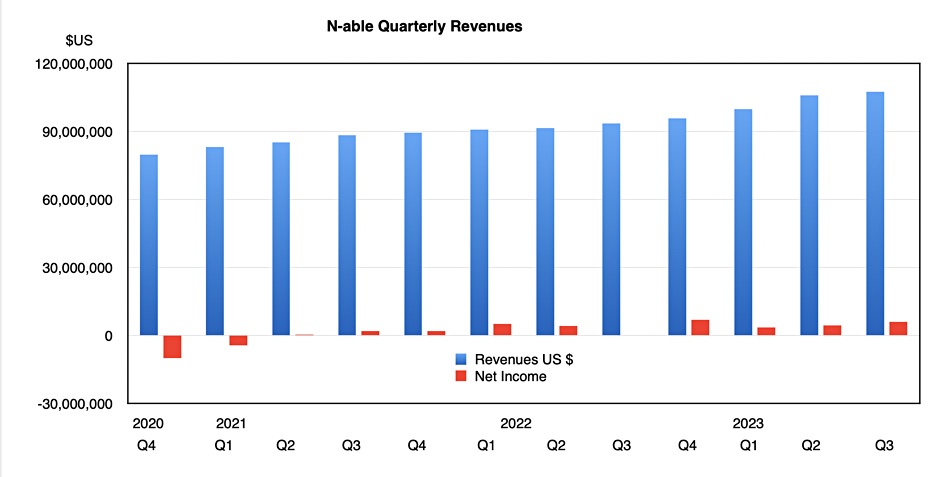
…
Cloud file data services supplier Nasuni and energy systems supplier Cegal are announcing a strategic partnership. The two will provide fast file access from anywhere, full cyber-resiliency, and facilitation of hybrid cloud infrastructure. In effect Cegal becomes a channel partner for Nasuni. Nasuni is also seeing strong momentum in the industry with a 235 percent increase in data managed for enterprise energy customers year-over-year, with organizations including Fugro, Geoactive, Ithaca Energy, and ENGIE replacing legacy file storage and enhancing data protection with the Nasuni File Data Platform.
…
Boston Igloo AI+ powered by PEAK:AIO is being unveiled at SC23 this week, designed to transform HPC and AI workloads by providing ultra-fast AI storage to power technologies such as Nvidia GPUs. The key features of Boston Igloo AI+ are:
- File and Block access
- Up to 80GBps plus throughput
- PEAK:PROTECT RAID 1, 10, 5, and 6
- GDS GPUDirect RDMA support
- Up to 737TB capacity in 2RU
- Lowers the cost barrier
This is claimed to outperform multi-node HPC storage solutions while remaining cost-effective. Its available now.
…
HPC filesystem supplier Quobyte has a partnership with Hitachi Vantara to provide a turnkey, fully integrated solution of hardware, software, and support. The Hitachi Vantara storage hardware product is not named. Quobyte has also the addition of RDMA (Remote Direct Memory Access) capability to its parallel distributed file system. Admins can now take advantage of Quobyte’s ability to automatically switch between IP and RDMA to optimizing performance. By offering a mixed-mode operation, Quobyte will now allow admins to operate Quobyte over traditional IP networks and RDMA-capable fabrics like Infiniband in the same cluster or infrastructure.
…
Interesting chart from Storage Newsletter, comparing analyst firms and HDD shipment numbers. They are pretty consistent:
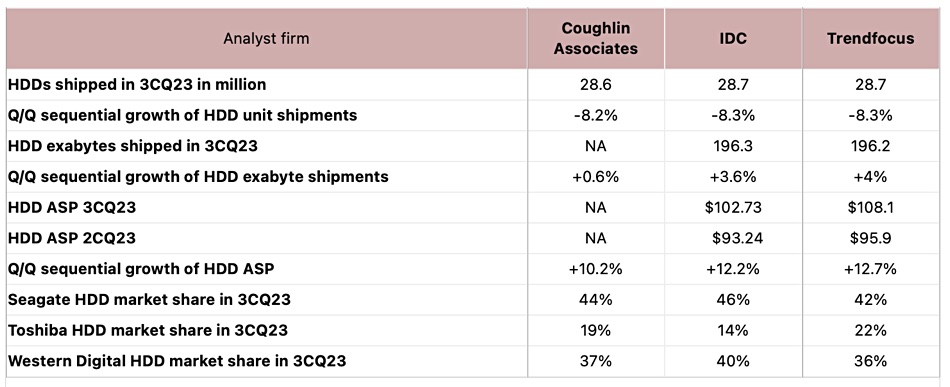
…
Top500.org has released its latest TOP500 supercomputer list. The Frontier system retains in the top spot and is still the only exascale machine on the list. There are five new or upgraded systems in the Top 10, including Aurora, the Azure cloud’s Eagle, Fugaku, and Lumi. Aurora is being commissioned and will reportedly exceed Frontier with a peak performance of 2 exaFLOPS when finished.
…
Veeam has launched Veeam Backup for Salesforce v2, available on Salesforce AppExchange. It extends support for multiple clouds, provides greater security with single sign-on (SSO) and multifactor authentication (MFA), and provides a safe environment for testing and developing via sandbox seeding. Organizations can deploy on-premises or in the cloud, recover exactly what they need when they need it, and experience backup that is custom-engineered for Salesforce data and metadata.
…
VergeIO is attacking VMware, unveiling a claimed risk-free VMware conversion services. Powered by IOmigrate, VergeIO ensures a frictionless transition of VMware virtual machines to VergeOS with just a few clicks. In light of Broadcom’s pending acquisition of VMware and growing user concerns about the state of the virtualization software and the company behind it – ranging from rising licensing costs, ransomware vulnerabilities, and diminishing quality of support – VergeIO is stepping up, offering complimentary professional services for VMware customers seeking an exit.
…
Virtuozzo announced the appointment of Sergey Dobrovolsky as CTO. Dobrovolsky joins Virtuozzo from Acronis, where he was VP Cyber Infrastructure. Virtuozzo provides open source-based hyperconverged cloud technology which it claims enables MSPs to reduce costs for customers by as much as 25 percent. Its HCI cloud is used by 600+ service providers, hundreds of thousands of businesses, and millions of end users across the world.
…
WekaIO is working with Applied Digital Corp, a designer, builder, and operator of digital infrastructure for high-performance computing (HPC) applications and workloads, to provide an underlying accelerated software architecture underpinning its recently launched AI Cloud Service. Applied Digital is developing a turnkey offering that allows enterprise customers to purchase and use GPU resources on-demand, at scale, across its datacenters for AI model training and inference in virtualized, bare metal, and containerization environments. Applied Digital’s customers use some of the world’s largest GPU clusters, with plans to scale to 10,000 GPUs or more per cluster, requiring data access of one terabyte per second or more.
Weka says its customers can achieve 1.8 terabytes per second of bandwidth in a single rack, lowering infrastructure costs and energy usage, improving GPU utilization by up to 20 times, and reducing training time by 10-100 times. Applied Digital has partnered with Weka to improve GPU utilization and efficiency, deliver high-performance data storage and management capabilities, simplify data onboarding, and allow customers to seamlessly scale deployments ranging from a fraction of a GPU to tens of thousands of GPU servers.
…
Chinese 3D NAND supplier YMTC is suing Micron in the USA for infringing eight of its patents; United States Patent Nos. 10,950,623 (building 3D NAND), 11,501,822 (non-volatile storage device and control method), 10,658,378 (pass-through array of three-dimensional memory device), 10,937,806 (control of Through Array Contact, TAC for 3D NAND memory device), 10,861,872 (3D NAND devices and methods of manufacturing), 11,468,957 (Architecture and methods for NAND operations), 11,600,342 (reading method of 3D NAND), and 10,868,031 (multi-layer stacked 3D NAND device and its manufacturing). The infringements are allegedly made by Micron’s 96L, 128L, 176L, and 232L NAND products. YMTC wants royalty payments.



